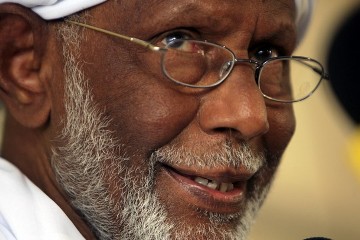Bashir government is formed on tribal lines : Turabi
July 6, 2015 (KHARTOUM) – The leader of the Islamist opposition Popular Congress Party (PCP) Hassan al-Turabi harshly criticized the new government of president Omer Hassan al-Bashir saying it is formed along tribal lines.

However speaking in a private gathering attended by a number of politicians on Sunday, the PCP leader said the new government was formed on tribal lines, and he expressed fears that ethnic politics promote narrow clan interests at the expense of democratic advancement.
He said that the faces that have been selected for ministerial positions, proved him that tribalism dominated in the choice of government officials.
“They appointed a minister from this clan, so they must give that one a ministerial portfolio also,” he said.
Since the launch of the national dialogue initiative by president al-Bashir in January 2014, Turabi refused to address any criticism to the government. Instead, he reiterated his support to the internal political process saying it represents the only alternative to end armed conflicts, achieve democratic changes and preserve the country from collapse.
On Sunday, the Islamist leader said he sticks to this stance and told the presence that the country still has very limited choices : “either dialogue or war”.
“I fear for the country too much. The revolution, if there is any, will not be like October and April (revolutions). The whole Sudan now is armed, though any violence will quickly spread across the whole country, and the situation will be worse than Somalia, Iraq, because we are from different tribes, and types;” he said.
Hover he ruled out the probability of a coup d’etat saying “the army now learnt the lesson and they know that military coups have become unacceptable by the international community”.
The Islamist leader also disclosed that Bashir had pledged in two meetings with the dialogue mechanism that he would not run for the president in April 2015 elections.
“I do not know why he changed his mind,” he wondered.
Different sources within the ruling National Congress Party (NCP) said last year that Bashir had no intention to run for the presidential race but power struggle between different factions in the party pushed him to accept.
The opposition minimises this version and says that he simply fears to be arrested and handed over to the International Criminal Court which issued two arrest warrant against him for war crimes and genocide in Darfur.
NEW POLITICAL BODY
The Islamist leader also said there are efforts to form a new political body that goes beyond traditional political divisions of opposition and government parties as it should only focus on rule of the religion in Sudan.
He also added that there is a debate within his party over its current name ”Popular Congress”, adding there are calls to change it.
“Now we are not enthusiastic about the name of Popular Congress, despite the presences of the party’s sections in the whole Sudan,” he said.
He pointed that he discussed with different forces on the need to agree on a platform based on religion, according to its principles, but he cautioned that the proposed body would not be a political organization or a party.
“We want a comprehensive movement to be thought and society,” he said, adding “civilizations are built by the peoples, not governments”..
Since last Mach different PCP officials spoke about a new political organization called “succession’s regime”.
The general idea speaks about the need to overcome the failure of Islamic parties to establish an Islamic state, and to gather the different Islamic forces and trends in one body aiming to establish an Islamic rule in Sudan and to take into account freedoms and diversity in Sudan .
Accordingly the Islamic state will be a societal objective and not a goal that a political force will seek to impose in the country.
(ST)
